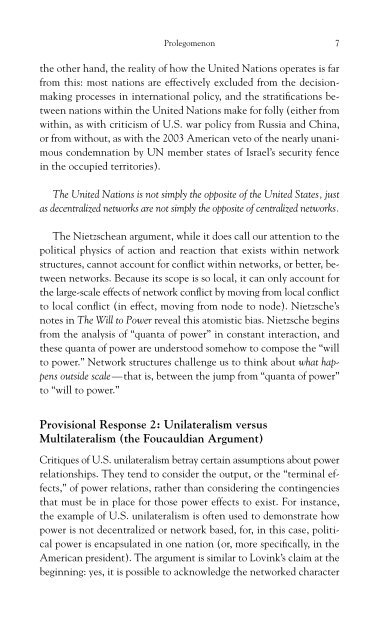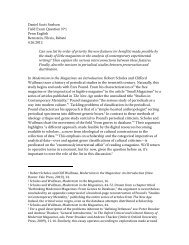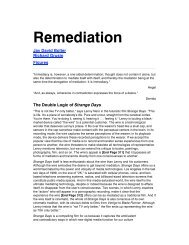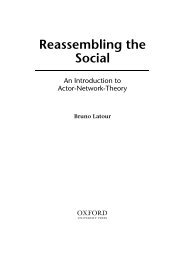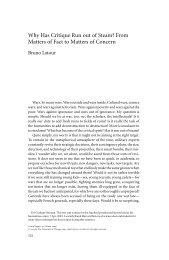The Exploit: A Theory of Networks - asounder
The Exploit: A Theory of Networks - asounder
The Exploit: A Theory of Networks - asounder
Create successful ePaper yourself
Turn your PDF publications into a flip-book with our unique Google optimized e-Paper software.
Prolegomenon 7<br />
the other hand, the reality <strong>of</strong> how the United Nations operates is far<br />
from this: most nations are effectively excluded from the decision -<br />
making processes in international policy, and the stratifications between<br />
nations within the United Nations make for folly (either from<br />
within, as with criticism <strong>of</strong> U.S. war policy from Russia and China,<br />
or from without, as with the 2003 American veto <strong>of</strong> the nearly unani -<br />
mous condemnation by UN member states <strong>of</strong> Israel’s security fence<br />
in the occupied territories).<br />
<strong>The</strong> United Nations is not simply the opposite <strong>of</strong> the United States, just<br />
as decentralized networks are not simply the opposite <strong>of</strong> centralized networks.<br />
<strong>The</strong> Nietzschean argument, while it does call our attention to the<br />
political physics <strong>of</strong> action and reaction that exists within network<br />
structures, cannot account for conflict within networks, or better, between<br />
networks. Because its scope is so local, it can only account for<br />
the large - scale effects <strong>of</strong> network conflict by moving from local conflict<br />
to local conflict (in effect, moving from node to node). Nietzsche’s<br />
notes in <strong>The</strong> Will to Power reveal this atomistic bias. Nietzsche begins<br />
from the analysis <strong>of</strong> “quanta <strong>of</strong> power” in constant interaction, and<br />
these quanta <strong>of</strong> power are understood somehow to compose the “will<br />
to power.” Network structures challenge us to think about what happens<br />
outside scale—that is, between the jump from “quanta <strong>of</strong> power”<br />
to “will to power.”<br />
Provisional Response 2: Unilateralism versus<br />
Multilateralism (the Foucauldian Argument)<br />
Critiques <strong>of</strong> U.S. unilateralism betray certain assumptions about power<br />
relationships. <strong>The</strong>y tend to consider the output, or the “terminal effects,”<br />
<strong>of</strong> power relations, rather than considering the contingencies<br />
that must be in place for those power effects to exist. For instance,<br />
the example <strong>of</strong> U.S. unilateralism is <strong>of</strong>ten used to demonstrate how<br />
power is not decentralized or network based, for, in this case, political<br />
power is encapsulated in one nation (or, more specifically, in the<br />
American president). <strong>The</strong> argument is similar to Lovink’s claim at the<br />
beginning: yes, it is possible to acknowledge the networked character


